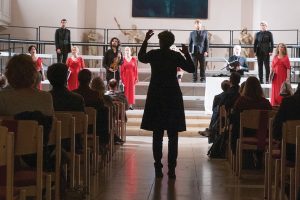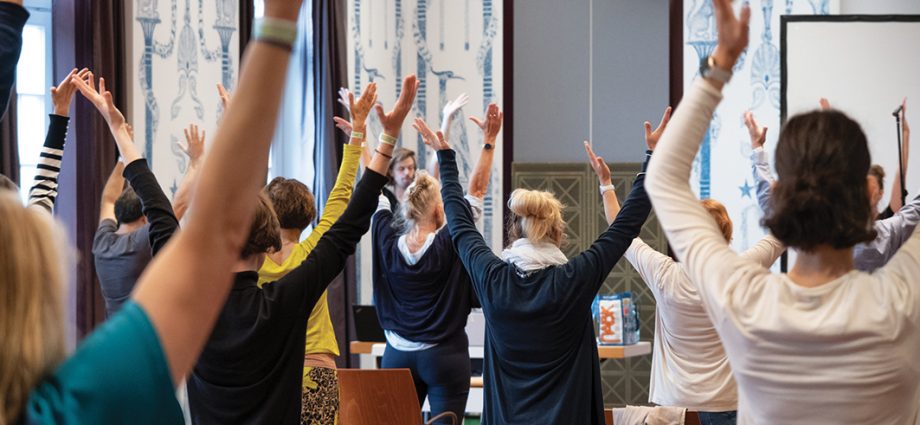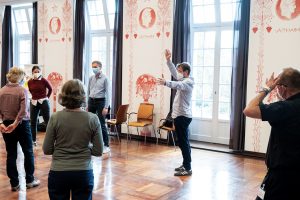Isabelle Métrope, ICB Managing Editor
In September 2021 I was able to experience an event that had been eagerly awaited by the whole choral scene: Chor.com. This takes place biennially, and the last meeting was in September 2019, just a few months before the outbreak of the pandemic. Chor.com is organised by the German Association of Choirs and is the largest Europe-wide specialist convention for choirs. Almost 1000 participants travelled to Hannover – a UNESCO City of Music since 2014 – to meet and assess the impact of the last 24 extraordinary months.

Program
Since the first convention – held in Dortmund in 2011 – Chor.com has established itself as an important event for musicologists, choir directors, choir managers, music publishers and more. Hot topics in choral music are debated. The focus may be on repertoire – this year it was Nordic choral music, which, though no longer an unknown rarity, continues to be popular with choirs and their audiences; or on historical performance practice – how to perform ancient music when the composers left no instructions; genre mixing issues like environmental sustainability for choirs[1]; or LGBTQA+ issues in the choral world. Indeed, the breadth of topics raised is reminiscent of the wonderful ACDA National Convention organised by our American colleagues. These conventions are vital in keeping the choral scene alive. Not every topic can be included, and some musicians may feel that no-one apart from themselves is interested in a particular issue; if ten people are enthusiastic about a new composer, an emerging topic, or a particular new idea, but live 1000km apart, they may not have found like-minded people to talk with. But it is at specialist conventions like chor.com that interest groups spring up, and projects are initiated which further enhance the choral scene.
Incidentally, thanks to the large number of lecturers at the convention who run seminars in English, it is quite possible for non-German speakers to attend.
Emotion
I was especially moved and happy to see my colleagues in person again, and I know I speak for all of them when I say this. At last, we could have live conversations. At last, we could talk about something other than “How long is this going to go on?”, “Are you allowed to rehearse?”, “What is the best software for online rehearsals?” At last, members of the choral scene had the opportunity to have the live conversations that they had wanted for so long – and some that they had not actively wanted but which turned out to be very lively, simply because they were new and unexpected. For many of them it felt like a breath of fresh air after 2 years spent indoors.
Of course, there was emotion of the musical sort in this year’s Chor.com. The 4-day convention offered several top-quality concerts, as well as the workshops and conducting master classes. The Covid rules in Germany had varied from state to state, although all of them had banned live concerts. But in summer 2021, musical life cautiously restarted, with social distancing, masks, QPR registering, contact-tracing forms and limited audience numbers. At Chor.com, the churches and concert halls could only be half filled (this also applied the workshop spaces, and here we must offer grateful thanks to the staff of the German Association of Choirs, who put in place unprecedentedly complicated arrangements in order to make the event possible.) Yes, there were queues, and entry to the concerts was by ticket only, but the event took place, providing the opportunity for ensembles from different countries to meet other participants in person for the first time in 2 years. Hearing of the difficulties my colleagues had dealt with, I felt privileged when I sat down at what promised to be the best concert of the whole event. And so it turned out to be. The sounds produced by the Norwegian Soloists’ Choir, directed by Greta Pedersen, had me spellbound in my seat for the whole hour, and I was powerfully reminded of how worthwhile all the complicated arrangements had been – the many hygiene measures, the purchasing of hundreds of testing kits, the careful measuring of the spaces between the orchestra seats. I feel eternally grateful to have been at that concert, and at other ones by Barberpapas and the Collegium Vocale of Ghent. My heart was gladdened by the warmth and the music in Hannover.
Inspiration
Like so many of the meetings of our choral associations, Chor.com is much more than just an annual event in the calendar. It inspires a wonderful mix of conversations in corners and corridors, watching our colleagues in action, brainstorming on relevant topics, listening to top choirs, discovering the unexpected, and rummaging eagerly through music publishers’ lists in search of new material.
Almost 1000 people went home from this event not only fulfilled, but inspired with new motivation, and reassured that the choral music scene is still alive, that the pandemic has not succeeded in silencing choral music and that during this time choral organisations have not been idle – quite the contrary. Here at the IFCM we are hoping, as you all are, that the developments in the pandemic will mean that it will not again prevent events like ours. Certainly, September 2022 is already firmly in our calendar, when the World Choral Expo will take place in Lisbon, and where the IFCM will mark its birthday – with much celebration, emotion and inspiration.
 Isabelle Métrope is a singer, a conductor and the managing editor of the International Choral Bulletin. She studied applied languages and music management, as well as conducting, singing and pedagogy, which is the cause as well as the result of a compulsive curiousity naturally leading to a strong interest in systematic musicology. Apart from singing solo and in several professional choirs, her favorite activities includes page setting, translating, baking cakes, taking pictures and travelling around the Mediterranean. Email: icb.editor@ifcm.net
Isabelle Métrope is a singer, a conductor and the managing editor of the International Choral Bulletin. She studied applied languages and music management, as well as conducting, singing and pedagogy, which is the cause as well as the result of a compulsive curiousity naturally leading to a strong interest in systematic musicology. Apart from singing solo and in several professional choirs, her favorite activities includes page setting, translating, baking cakes, taking pictures and travelling around the Mediterranean. Email: icb.editor@ifcm.net
Translated by Caroline Maxwell, UK
[1] See our Focus in ICB 2021-3, July 2021



